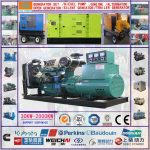Introduction:
Diesel generators play a crucial role in providing backup power in various applications, including industrial, commercial, and residential settings. These generators are known for their reliability, efficiency, and durability, making them a popular choice for power generation in areas where grid power may be unreliable or unavailable. Performance analysis of diesel generators is essential to ensure optimal operation, efficiency, and longevity of these critical power sources. In this article, we will delve into the key aspects of performance analysis of diesel generators, including key parameters, testing methods, and considerations for maintenance and optimization.
Key Parameters for Performance Analysis:
1. Power Output: The power output of a diesel generator is a critical parameter that determines its capacity to provide electrical power. The power output is typically expressed in kilowatts (kW) or megawatts (MW) and is influenced by factors such as engine size, fuel efficiency, and generator design.
2. Fuel Consumption: Fuel consumption is another key parameter that directly impacts the operating costs of a diesel generator. Monitoring fuel consumption allows operators to assess the efficiency of the generator and identify any potential issues that may be affecting fuel efficiency.
3. Voltage Regulation: Voltage regulation refers to the ability of the generator to maintain a stable output voltage under varying load conditions. Poor voltage regulation can lead to electrical issues and damage to connected equipment. Performance analysis should include testing the voltage regulation capabilities of the generator.
4. Frequency Stability: The frequency stability of a diesel generator refers to its ability to maintain a consistent output frequency, typically 50 Hz or 60 Hz, under changing load conditions. Frequency stability is crucial for ensuring the proper functioning of electrical equipment connected to the generator.
5. Load Response: The load response of a diesel generator refers to its ability to quickly and effectively respond to changes in load demand. A generator with a fast and stable load response is essential for maintaining a reliable power supply in dynamic operating conditions.
6. Efficiency: The efficiency of a diesel generator is a measure of how effectively it converts fuel into electrical power. High efficiency generators consume less fuel and produce lower emissions, making them more environmentally friendly and cost-effective in the long run.
200kw diesel generator for sale for Performance Analysis:
1. Load Testing: Load testing involves applying a specific load to the generator and monitoring its performance under varying load conditions. Load testing helps assess the generator's capacity, voltage regulation, frequency stability, and load response capabilities.
2. Fuel Consumption Analysis: Fuel consumption analysis involves measuring the amount of fuel consumed by the generator over a specific period of operation. This data can be used to calculate the generator's fuel efficiency and identify any issues that may be affecting fuel consumption.
3. Voltage and Frequency Testing: Voltage and frequency testing involves measuring the output voltage and frequency of the generator under different load conditions. This helps ensure that the generator is operating within acceptable limits and can provide a stable power supply.
4. Efficiency Testing: Efficiency testing involves calculating the efficiency of the generator by comparing the input fuel consumption with the output electrical power generated. This helps identify opportunities for improving efficiency and reducing operating costs.
Considerations for Maintenance and Optimization:

1. Regular Maintenance: Regular maintenance is essential for ensuring the optimal performance and longevity of a diesel generator. This includes routine inspections, oil and filter changes, fuel system maintenance, and testing of critical components such as the alternator and voltage regulator.
2. Monitoring and Diagnostics: Implementing a monitoring system that tracks key performance parameters of the generator can help identify potential issues before they escalate into major problems. Regular diagnostics and troubleshooting can help optimize the performance of the generator and prevent unexpected downtime.
3. Load Management: Proper load management is crucial for maximizing the efficiency and reliability of a diesel generator. Avoiding overloading or underloading the generator, balancing the load across multiple generators if applicable, and implementing load shedding strategies can help optimize the performance of the system.
4. Fuel Quality: The quality of fuel used in a diesel generator can significantly impact its performance and efficiency. Using high-quality fuel that meets the manufacturer's specifications and implementing proper fuel storage and handling practices can help ensure optimal generator performance.
Conclusion:
Performance analysis of diesel generators is essential for ensuring the reliable operation, efficiency, and longevity of these critical power sources. By monitoring key parameters such as power output, fuel consumption, voltage regulation, frequency stability, load response, and efficiency, operators can identify opportunities for maintenance, optimization, and improvement. Implementing testing methods, maintenance practices, and optimization strategies can help maximize the performance of diesel generators and ensure a stable and reliable power supply in various applications.
